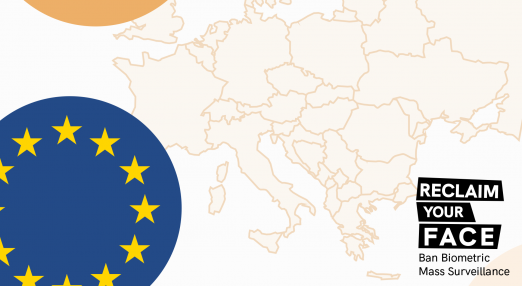EDPS sanctions the European Parliament for illegal EU-US data transfers – among other violations
In January 2021, noyb filed a complaint against the European Parliament on behalf of six Members of the European Parliament over an internal corona testing website. The issues raised were deceptive cookie banners, vague and unclear data protection notices, and the illegal transfer of data to the US.
Filter resources
-

EDPS sanctions the European Parliament for illegal EU-US data transfers – among other violations
In January 2021, noyb filed a complaint against the European Parliament on behalf of six Members of the European Parliament over an internal corona testing website. The issues raised were deceptive cookie banners, vague and unclear data protection notices, and the illegal transfer of data to the US.
Read more
-

Managed by Bots: surveillance of gig-economy workers
WIE’s recent ‘Managed by Bots’ report demonstrates that opaque algorithms dictate almost every aspect of gig economy employees’ work, offering them limited visibility or avenues for redress when a decision is made about them.
Read more
-

E-evidence regulation: Why it matters for medical confidentiality?
Access to health data by foreign authorities in the context of a criminal investigation – be it intentional or not – needs to be carefully regulated as it also impacts doctors’ legal and ethical duties.
Read more
-

Nearly 130 public interest organisations and experts urge the United Nations to include human rights safeguards in proposed UN Cybercrime Treaty
Today, EDRi, our member Electronic Frontier Foundation (EFF), and Human Rights Watch, along with nearly 130 organizations and academics working in 56 countries, regions, or globally, urged members of the Ad Hoc Committee responsible for drafting a potential United Nations Cybercrime Treaty to ensure human rights protections are embedded in the final product. The first session of the Ad Hoc Committee will begin on January 17th.
Read more
-

European court supports transparency in risky EU border tech experiments
The Court of Justice of the European Union has ruled that the European Commission must reveal initially-withheld documents relating to the controversial iBorderCtrl project, which experimented with risky biometric ‘lie detection’ systems at EU borders. However, the judgement continued to safeguard some of the commercial interests of iBorderCtrl, despite it being an EU-funded migration technology with implications for the protection of people’s rights.
Read more
-

EDRi-gram, 15 December 2021
In this last edition of the EDRi-gram for 2021, we look at the good, the bad and the ugly in the much-anticipated Digital Services Act report, approved by the European Parliament IMCO Committee this week. We also take a look back at this year of resilience, reflecting on the impact EDRi and the Reclaim Your Face coalition had on digital rights.
Read more
-

Opinion on the Passenger Name Record CJEU case
In Case-817/19, Belgium’s Constitutional Court has asked the EU Court of Justice whether the PNR Directive (2016/681) is compatible with the Charter of Fundamental Rights. The hope must be that the Court will stand up for the rights of individuals, enforce the Charter of Fundamental Rights, and declare the PNR Directive (like the Data Retention Directive) to be fundamentally in breach of the Charter.
Read more
-

2021: Looking back at digital rights in the year of resilience
We started 2021, hoping to leave the tremendously challenging year of 2020 behind. The Covid-19 pandemic has had a devastating impact on our societies, causing unprecedented harm to people and economies. If 2020 was the year of the pandemic shock, 2021 was the year of resilience. We had to learn to live in a constant uncertainty of what it would take to keep defending human rights: Could we work and walk down the streets without being constantly surveilled? Would efforts to tackle disinformation distort legitimate content, or would they bring down Big Tech instead? Will 2022 be 2021 2.0?
Read more
-

Nani Jansen Reventlow receives the Felipe Rodriguez Award 2021
The Felipe Rodriguez Award is an important part of Bits of Freedom’s annual Big Brother Awards. Each year the organisation present this award to someone who, in their own, bold way, has done something remarkable for your right to privacy. This year the award goes to Nani Jansen Reventlow.
Read more
-

A beginner’s guide to EU rules on scanning private communications: Part 1
In July 2021, the European Parliament and EU Council agreed temporary rules to allow webmail and messenger services to scan everyone’s private online communications. In 2022, the European Commission will propose a long-term version of these rules. In the first installment of this EDRi blog series on online ‘CSAM’ detection, we explore the history of the file, and why it is relevant for everyone’s digital rights.
Read more
-

Reclaim Your Face impact in 2021
A sturdy coalition, research reports, investigations, coordination actions and gathering amazing political support at national and EU level. This was 2021 for the Reclaim Your Face coalition – a year that, despite happening in a pandemic – showed what the power of a united front looks like.
Read more
-

Romania uses the EECC Directive implementation to extend communication surveillance
A new proposal to extend communication surveillance and to intercept encrypted communications was hidden by the Romanian Government in the national implementation of the European Electronic Communications Code (EECC Directive) and was passed without any discussion in the Romanian Chamber of Deputies on 7 December 2021.
Read more
